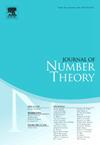全等数的必要条件:pq 的素数 p≡1 (mod 8) 和 q≡3 (mod 8)
IF 0.6
3区 数学
Q3 MATHEMATICS
引用次数: 0
摘要
在本文中,我们建立了一个关键的条件,即一个 n 形式的数,有两个质因数 p 和 q,且 (p,q)≡(1,3)(mod8), 才能被称为全等数。具体地说,我们提出了当 n 为全等数时,虚二次域 Q(-2pq) 的类数的 2 部分的 modulo 16 全等关系。本文章由计算机程序翻译,如有差异,请以英文原文为准。
Required condition for a congruent number: pq with primes p ≡ 1 (mod 8) and q ≡ 3 (mod 8)
In this paper, we establish a crucial requirement for a number of the form n, having two prime factors p and q such that , to qualify as a congruent number. Specifically, we present congruence relations modulo 16 for the 2-part of the class number of the imaginary quadratic field when n is congruent.
求助全文
通过发布文献求助,成功后即可免费获取论文全文。
去求助
来源期刊

Journal of Number Theory
数学-数学
CiteScore
1.30
自引率
14.30%
发文量
122
审稿时长
16 weeks
期刊介绍:
The Journal of Number Theory (JNT) features selected research articles that represent the broad spectrum of interest in contemporary number theory and allied areas. A valuable resource for mathematicians, the journal provides an international forum for the publication of original research in this field.
The Journal of Number Theory is encouraging submissions of quality, long articles where most or all of the technical details are included. The journal now considers and welcomes also papers in Computational Number Theory.
Starting in May 2019, JNT will have a new format with 3 sections:
JNT Prime targets (possibly very long with complete proofs) high impact papers. Articles published in this section will be granted 1 year promotional open access.
JNT General Section is for shorter papers. We particularly encourage submission from junior researchers. Every attempt will be made to expedite the review process for such submissions.
Computational JNT . This section aims to provide a forum to disseminate contributions which make significant use of computer calculations to derive novel number theoretic results. There will be an online repository where supplementary codes and data can be stored.
 求助内容:
求助内容: 应助结果提醒方式:
应助结果提醒方式:


